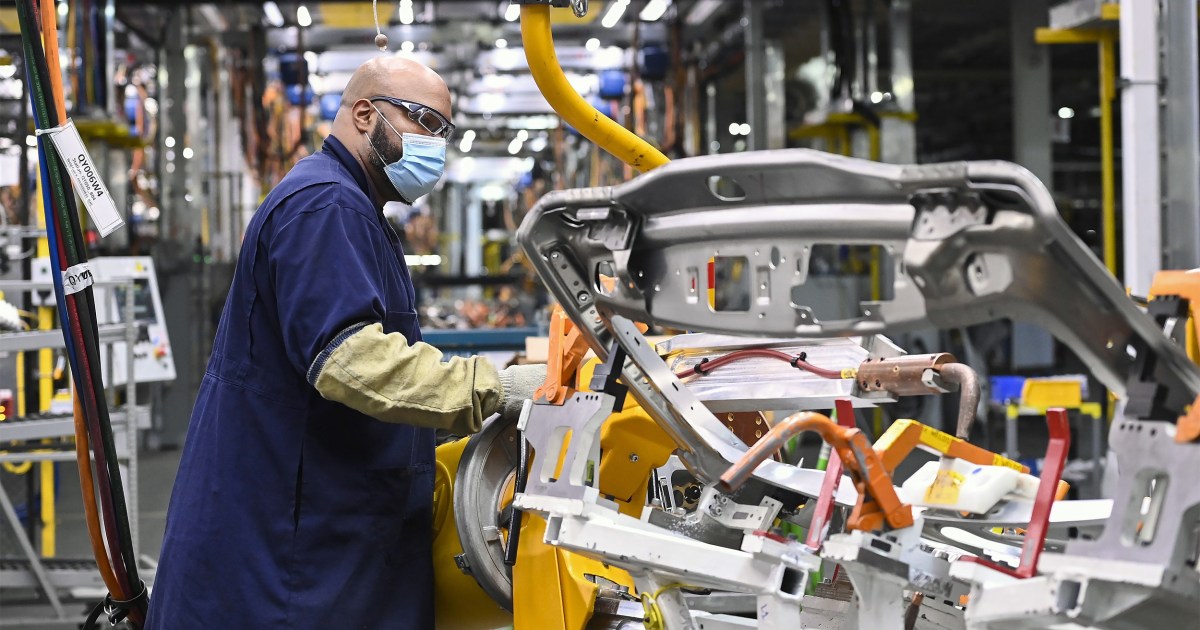
Parts shortages are crippling the auto industry, which is still struggling to bounce back from last year's pandemic production shutdowns — and the situation is growing worse as the problem spreads from microchips to seating foam and plastics.
The biggest problem has been a shortage of the chips used to control everything from powertrains to digital safety systems. That has resulted in closings or production cuts by many of the industry's largest manufacturers in the past few weeks, including General Motors, Honda, Nissan, Volkswagen, Ford, Toyota and Stellantis.
"We continue to manage a number of supply chain issues related to the impact from Covid-19, congestion at various ports, the microchip shortage and severe winter weather," Honda said in a statement, adding, "In some way, all of our auto plants in the U.S. and Canada will be impacted, with most of the plants temporarily suspending production during the week of March 22."
The shortages have meant Ford has cut a shift at its Kentucky Truck Plant, which produces its Super Duty pickup trucks, the Ford Expedition and the Lincoln Navigator, until next week. Another Kentucky assembly plant, in Louisville, is expected to reopen Tuesday after it shuttered last week because of chip shortages. Nissan has cut back or canceled production of several models, including the Murano and Rogue SUVs, the Leaf crossover and the Maxima sedan. Toyota has trimmed production of popular models in the U.S. and Mexico, including the Camry sedan and the RAV4 SUV.
Volvo, whose South Carolina plant producing the S60 sedan has been affected, said in a statement Monday that the chip shortage "will have a substantial impact on the Volvo Group's production in the second quarter." Volvo said that it will implement "stop days" of two to four weeks and that "the disturbances are expected to have a negative impact on earnings and cash flow."
General Motors has faced stop-and-go production problems in recent weeks when its own microchip supplies ran short. It tried to work around the problem at one plant by redesigning an engine control module for its Chevrolet Silverado and GMC Sierra pickups. While the vehicles still meet federal emissions standards, the workaround reduces their fuel economy by about a mile a gallon, GM confirmed.
Today's cars can use 100 or more microprocessors, making the industry particularly vulnerable to supply disruptions. The crisis was triggered by pandemic production cuts last year, when chipmakers had strong demand from consumer electronic companies experiencing booming demand for electronics from TVs to smartphones to webcams during Covid-19 lockdowns.
Chip manufacturers say they don't have the capacity to quickly ramp up production for the auto industry as car sales recover. President Joe Biden last month called for $37 billion in new funding "to work with industrial leaders to identify solutions to the semiconductor shortfall." He also signed an executive order calling for a 100-day review of supply chains. It's unclear how soon any of the measures might boost production and help refill the order pipeline.
Adding to the crisis, some manufacturers are running out of critical petroleum-based products after the recent freezing weather in Texas led to shutdowns of key petrochemical plants. Industry analysts expect shortages of plastics and petroleum-based automotive products, especially seating foam.
It is a particularly tough time for the auto industry. North American manufacturing was halted for about two months last spring because of the pandemic. Since they reopened, automakers have struggled to refill showrooms. Inventory on U.S. dealer lots is down by at least a million vehicles compared to what would be normal this time of year, according to the research company J.D. Power.
Consumers are feeling the pinch in several ways, analysts said. Buyers may find it harder to find the exact models they want, especially when it comes to color and accessories. With supplies short, meanwhile, automakers have cut back on incentives, while salespeople have less need to cut deals.
But idling production and reducing sales will have a big impact on the collective bottom line. Ford warned that the chip shortage alone could reduce earnings by $1 billion to $2.5 billion this year. General Motors put its number at $2 billion. While Honda didn't put out a dollar figure, it warned last month that it expects to sell about 100,000 fewer vehicles worldwide this year solely because of the chip shortages.
"industry" - Google News
March 23, 2021 at 06:11AM
https://ift.tt/395mSIR
From chips to seating foam to plastics, parts shortages continue to cripple auto industry - NBC News
"industry" - Google News
https://ift.tt/2RrQtUH
https://ift.tt/2zJ3SAW
Bagikan Berita Ini














0 Response to "From chips to seating foam to plastics, parts shortages continue to cripple auto industry - NBC News"
Post a Comment